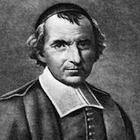
Jean Meslier (1664-1729) was born in Mazerny, in the Ardennes, and for most of his life he was a priest in the villages of Étrépigny and Balaives in Champagne. Shortly after his death were found three copies of a thick manuscript addressed to his former parishioners, which showed radical atheism, materialism and egalitarianism. Isolated from the intellectual circles and owner of few books, but chosen (especially from Montaigne), the originality of his work is surprising. And its virulence, unprecedented. Copies of the manuscript - written between 1723 and 1729 - circulated like gunpowder among enlightened media, and in 1762 Voltaire published an anthology that was quite sweetened under the title of Testament. The Baron of Holbach, heavily influenced by Meslier, published a summary of his System of Nature under the title of Common Sense of the Meslier priest. The influence of his work in the illustrated media was enormous, since Voltaire turned it into a myth, "a myth as was the Encyclopedia", according to the author of the epilogue, Julio Seoane. "Meslier should be in everyone's hands," Voltaire wrote. Of course, the impression Meslier left on the author of Candide was overwhelming.











